Recruitment building blocks: Understanding American Lobster (Homarus americanus) growth and environmental effects during the first year

Project overview:
A team of scientists from the University of Maine and the Maine Department of Marine Resources (MEDMR) will adapt and test a new early life history tagging method to apply towards answering key questions about growth and development phenology in the first year of life in American lobsters (Homarus americanus). The MEDMR has been conducting a regional larval lobster monitoring survey to document seasonality and density of larvae since 2018, and a coast-wide lobster settlement survey for Maine since 2005 to monitor the abundance of young-of-year (YOY) lobsters. It has been challenging to link abundance patterns in the geographically-restricted larval lobster survey to those observed in the coast-wide YOY survey due to a spatial mismatch in data series; this project seeks to evaluate this mismatch by testing new methods within these surveys and by focusing on growth and size potential within the first year of lobster’s life history. Results will broadly inform our understanding of lobster recruitment success within the Gulf of Maine under current and future climate conditions, apply the use of YOY growth data within the context of population dynamics to inform potential shifts to our long-term monitoring surveys, and evaluate how updated size and growth metrics may influence recruitment estimates derived from MEDMR surveys before being incorporated in the ASMFC stock assessment.
Position responsibilities:
Applications are invited for a full-time Masters-level graduate research position in the School of Marine Sciences and to be located at the University of Maine’s Darling Marine Center in Walpole, Maine. This project is fully funded for two years, including a graduate student stipend.
Responsibilities will include:
- Assisting MEDMR staff with surveys, field collections, and measurements of larval lobsters as part of the ongoing larval monitoring program;
- Running laboratory experiments evaluating tag retention, growth, and survival under different temperature regimes that align with current and projected climate conditions in the Gulf of Maine;
- Building and running statistical models;
- Leading development of 1-2 publications stemming from the project results; and
- Co-mentoring undergraduate interns assisting on project field and laboratory tasks.
Qualifications:
Required:
- A completed Bachelor’s degree by December 2024
- Strong background and interests in ecology, fisheries, and climate adaptation
- Excellent problem-solving abilities
- Strong communication within a highly collaborative environment
- Organized to be able to perform project and data management
- Comfortable working in difficult field conditions (e.g., heat, rain, humidity, rough seas)
- Animal handling experience, particularly with delicate species or life stages, or steady hands
- Swimming ability
- Ability to work independently and as part of a collaborative team
- Applicants must be currently authorized to work in the United States on a full-time basis.
- Valid U.S. driver’s license
Preferred:
- One or more years of experience working at a fisheries management agency or other marine science institution
- Prior experience, coursework, and training in data management and quantitative methods (basic statistical models) and use of Excel and R is good; applied knowledge of R towards data management or ecological statistics is great;
- Some experience with GIS (Arc / QGIS), but courses are available
- Experience with cold water scuba diving
- Boat experience in the Gulf of Maine or similar conditions
Location: Darling Marine Center, Walpole ME
Start date: Ideally January 2025 for a Spring semester start
How to apply: Email Michelle Staudinger (michelle.staudinger@maine.edu) a C.V and 1 page cover letter outlining interest, related experience to the project, how this MS fits into your career trajectory, and confirmation of B.S. degree. Applicants will need to apply and be accepted to the UME graduate school. More information on this process can be found https://umaine.edu/staudingerlab/come-school-with-us/
Review of applications will begin on October 15, 2024, and will continue until the position is filled.
